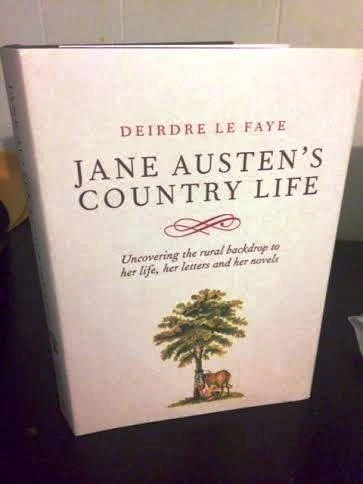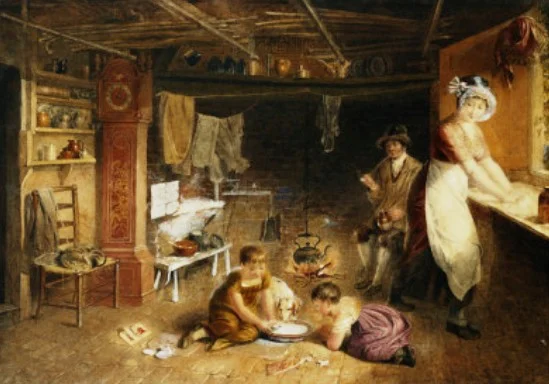Jane Austen's Country Life by Deirdre Le Faye: A Review
Jane Austen lived for nearly all her life in two Hampshire villages: for
25 years in her birthplace of Steventon, and then for the last 8 years
of her life in Chawton, during which latter period she wrote and
published her great novels. While there are plenty of books describing
her periods of urban life in Bath, Southampton and London, and the
summer holidays in Lyme Regis and other West Country seaside resorts, no
consideration has been given to this rural background to her life. Her
father was not only the rector of Steventon but a farmer there as well,
managing a property of some 200 acres. Her brother Edward, in addition,
was a large landowner, holding the three estates of Godmersham in Kent,
Steventon and Chawton in Hampshire. Agriculture in all its aspects was
even more important to Jane than clerical life or the naval careers of
her younger brothers.
This book fills a gap in the Austen family background, discussing the state of agriculture in general in the south of England during the wartime conditions which lasted for most of Jane Austen's life, and considering in particular the villages and their inhabitants, the weather conditions, field crops, farm and domestic animals, and the Austens' household economy and rural way of life. All appear in Austen's letters, and appear also unobtrusively in her novels, lending that air of verisimilitude for which her works are famous. Apart from these obvious sources, there are other Austen family manuscripts, as yet unpublished, which provide particular and unique information.
This book fills a gap in the Austen family background, discussing the state of agriculture in general in the south of England during the wartime conditions which lasted for most of Jane Austen's life, and considering in particular the villages and their inhabitants, the weather conditions, field crops, farm and domestic animals, and the Austens' household economy and rural way of life. All appear in Austen's letters, and appear also unobtrusively in her novels, lending that air of verisimilitude for which her works are famous. Apart from these obvious sources, there are other Austen family manuscripts, as yet unpublished, which provide particular and unique information.
Hardcover, 256 pages
Published
June 1st 2014
by Frances Lincoln"She sighed for the air, the liberty, the quiet of the country."
Mariana Dashwood, Sense &Sensibility
Work and Play in the Kitchen, watercolour by Thomas Heaphy (1775-1835) private collection, Bridgemann Art Library
This is not a novel nor is it a
biography of Jane Austen's life. Instead, Deirdre Le Faye has passionately
written and researched the life of The Austen Family while keeping the focus on
how the rural aspect of their life influenced their family dynamic. It is
fascinating and challenging reading very well researched while taking great
strides to include not only excerpts from Jane and her siblings but her parents
Mr. and Mrs. Austen as well. I cannot say how much I loved reading Jane's
mother's letters and descriptions of tending her garden throughout all four
seasons, her livestock, her family dynamic as a wife and mother as well. If
that is not enough, you also get the male perspective on rural family life with
the religious undertone of the head of the family, Mr. Austen himself!
This is a beautiful hardcover book, illustrated throughout with period paintings, maps, engravings and etchings from famous artists of the eighteenth century. How lovely it was to turn page after page and see a rural painting next to the letters of The Austen Family living in two Hampshire towns i.e. Steventon and Chawton. Also, as an American and glorified Anglophile, the British or English countryside cottage vs. township aspect of rural life was not lost on me. Real history and familial relationships are discussed and preserved with respect in, Jane Austen's Country Life.
This is a beautiful hardcover book, illustrated throughout with period paintings, maps, engravings and etchings from famous artists of the eighteenth century. How lovely it was to turn page after page and see a rural painting next to the letters of The Austen Family living in two Hampshire towns i.e. Steventon and Chawton. Also, as an American and glorified Anglophile, the British or English countryside cottage vs. township aspect of rural life was not lost on me. Real history and familial relationships are discussed and preserved with respect in, Jane Austen's Country Life.
I must impress the point that in Jane Austen's Country Life you get exactly that. Aspects of The Austen Family life in two rural towns is provided chronologically while reading their letters but also very dense geographical and topographical seasonal dry writing chapter after chapter giving a rare realistic glimpse into eighteenth century living of a poor family struggling to make ends meet. Reading this might be serious at times but it is also fascinating to gain insight into rural familial life. Thankfully, some Austen family letters have been preserved enough to get a dense understanding of who they were and how they loved and supported each other. I often wondered that if Jane Austen had not become so popular and if her novels had not survived decade after decade, would we have ever known about them? The Austen's were just another family surviving on a farm, season after season. It is easy to forget how hard people had it in this time of instant gratification and with technology at our fingertips. There is no such thing as privacy anymore with email's being shared publicly and sites like Twitter and Instagram we have forgotten as a human race what it is like to write a letter by hand and mail it in an envelope with a stamp or not have our iphones at the ready!
I hope everyone who wants to know what country life was like for Jane's immediate family and how her family made it into her novels, please give Jane Austen's Country Life a chance and harken back to a simpler time.
I was given a copy of Jane Austen's Country Life in exchange for my honest review. Thank you, Frances Lincoln Publishers
Chawton Cottage, Hampshire, drawing by A. H. Hallam Murray, 1897.



Comments